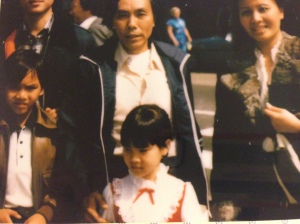In 1981, our family was reunited when my dad joined us in the U.S. after his boat was rescued by an American Navy vessel following its interception by pirates.
My mom dressed us in our best clothes to greet dad at LAX. I had no memory of my dad from childhood, and suspiciously gave him the once over as I met a gaunt-looking, shaggy haired man with a broad grin for the first time. After my dad’s arrival, we moved out of my uncle’s house and into our first family home — a one bedroom apartment in Whittier. Our rent was $400 a month. Two beds and a mattress lined the floor from wall to wall. I was happy, we had everything we needed — enough to eat, decent hand-me-down clothes from my mom’s siblings, and an old beater station wagon in which to get around. Best of all, we were all safe and together, a small miracle given the journey.
Greeting dad at LAX for the first time

It took me a little while to get to know my dad and to trust him. On the rare occasion when it was just the two of us in the car heading to a destination I was unfamiliar with, I would wonder if he was trying to kidnap me. My early experiences in the refugee camp had left me in a state of high alert. At the same time, my dad was also getting accustomed to having us around. Early on, he took me to a grocery store, and promptly drove off without me, forgetting that I had accompanied him on the trip. My M.O. was to park myself in the toy aisle, and after a while search out my parents or peak outside to make sure our car was still parked in the same spot and they hadn’t left without me. To my surprise and sheer panic, our car was no longer there. My dad quickly realized something was missing and came back to get me before mom was the wiser.
The apartment building we lived in was filled with other young families, many of them refugees from Laos, and some from Eastern Europe. We were surrounded by people with similar experiences of displacement. My brother’s best friend was Todd, a Laotian boy, while my best friend was Ysumi, a girl from Yugoslavia. We had a swimming pool in the apartment complex, something the other kids enjoyed immensely, while I mainly looked on from the sidelines. My mom did not want me to get dark. In Vietnamese culture, girls are valued for the light tone of their skin, and for being demure. My mom does not know how to swim or ride a bike. If I had not pushed the boundaries and pestered my parents to the degree that i did, I might not know the joy of riding a bike or swimming in the ocean. Luckily, my persistence prevailed.
Truthfully, there was no stopping me, I was such a tomboy and had a mind of my own even then. When I came home one day with a bloody gash on my knee after falling off a bike, my mom made it clear from the steely look on her face that I would get no sympathy or help from her. Through her lens of growing up in Vietnam, it was more important for me to be pristine than to play or enjoy new experiences. Girls were valued for their appearance and not necessarily for their ability. You can still see the scar on my right knee today.
Meanwhile, since my dad was a scholar, he inherently valued smarts, and proficiency in mathematics in particular. He started his career as a math teacher before becoming a lawyer and was notorious for tossing his students’ books out of his classroom if they were caught not paying attention. When I was eight years old, I asked for my dad’s help in his area of expertise. I knew to pay attention and try my hardest. Still, I got the answer wrong to a math problem we were working through together. He was so incensed that he snapped and slapped me hard across the face. My cheek stung from the slap while my face burned with the injustice of being treated so harshly for what was hardly an offense. I went to my mom for comfort and announced that I would never again ask dad for help with homework. And I didn’t from that day forward. I learned how to set boundaries that day and to stand up for myself. Those skills have taken me a long way.
These clashes were born from the patriarchal culture in which my parents were raised. It is a tribute to how much they loved me and how flexible they were with their own beliefs that these are the two biggest beefs that I can gripe about as an adult. In the attempt to bridge the gap between two generations and two vastly different cultures, so much more could have gone wrong. I’m thankful to my parents for always putting our family first and raising a strong-willed daughter, even if they didn’t mean to.

Ah Tina, I see that you have great resilience and courage and wonderful insight. Keep writing. Your voice will bless many. Annabelle